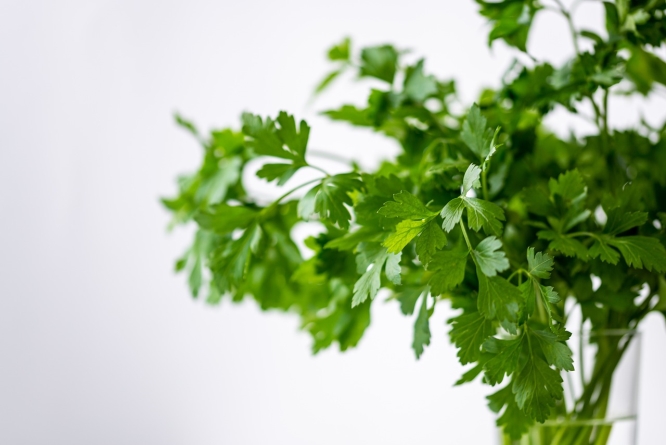
Nutrition Facts About Coriander
Coriander leaves, also known as cilantro, offer a plethora of health benefits due to their rich nutrient profile. Not only are they an excellent source of Vitamin A and Vitamin C, but they also contain a wide range of other essential nutrients. A single serving of coriander leaves is packed with dietary fiber, iron, manganese, calcium, vitamin K, phosphorus, and more.
This remarkable herb consists of 11 essential oils and is remarkably low in saturated fat. It contains a significant amount of linoleic acid, which contributes to various health advantages. According to the National Institute of Nutrition (NIN), 100 grams of coriander leaves provides approximately 31 kcal of energy, 2 grams of carbohydrates, 4 grams of protein, and 0.7 grams of fat. Furthermore, it contains 146 milligrams of calcium, 5.3 milligrams of iron, and 4.7 grams of dietary fiber. Additionally, coriander leaves are a great source of 24 milligrams of Vitamin C and 635 milligrams of Vitamin A, among other nutrients.
In summary, coriander leaves offer an array of essential nutrients and vitamins, including Vitamin A, Vitamin C, dietary fiber, iron, manganese, calcium, vitamin K, phosphorus, and more. Incorporating coriander leaves into your diet can provide numerous health benefits, thanks to their nutrient-rich composition.
Health Benefits of Coriander Leaves
1. May Enhance Vision Health
Throughout generations, our grandmothers have imparted wisdom about the importance of incorporating coriander into our meals for maintaining healthy eyes. Their advice holds merit as coriander leaves are rich in essential nutrients such as Vitamin A, Vitamin C, Vitamin E, and carotenoids, all of which contribute to promoting excellent vision. Scientific research has further substantiated these claims, revealing that regular consumption of coriander can effectively delay the onset of age-related macular degeneration (ARMD) and aid in the healing process of conjunctivitis. Embrace the potential benefits of coriander leaves and safeguard your precious eyesight.
2. May Help Control Bad Cholesterol
Amidst the current lifestyle trends, high cholesterol problems afflict a significant number of individuals. However, incorporating coriander leaves into your diet on a regular basis may offer a potential solution. Studies suggest that consuming coriander leaves regularly can contribute to reducing levels of LDL (bad) cholesterol while simultaneously improving levels of HDL (good) cholesterol. By embracing the inclusion of coriander leaves in your meals, you may be able to address these cholesterol concerns and promote a healthier lipid profile.
3. Boosts Immunity
With their abundant reserves of Vitamin C, Vitamin E, and Vitamin A, coriander leaves can play a vital role in fortifying your immune system over time. Vitamin C, in particular, aids in the efficient functioning of white blood cells, bolstering your body’s defense mechanisms. Additionally, it facilitates the absorption of iron, further enhancing your immune response. By incorporating coriander leaves into your diet, you can gradually strengthen your immune system and equip your body to ward off illnesses more effectively.
4. May Help Control Blood Sugar Levels
The vibrant green hue of coriander is a result of its antioxidants, which play a role in enhancing enzyme activity. Consequently, it stimulates the secretion of insulin, thereby aiding in the reduction of blood sugar levels. Incorporating coriander into your daily meals or consuming coriander-infused water regularly can be advantageous for individuals dealing with elevated blood sugar levels.
5. May Improve Bone Health
Coriander leaves are abundant in essential bone-strengthening minerals such as calcium, manganese, magnesium, and phosphorus. Additionally, the anti-inflammatory properties of coriander help safeguard the bones against pain associated with arthritis.
6. May Improve Skin Health
With its rich content of iron, Vitamin E, and Vitamin A, coriander serves as a potent defender against harmful free radicals that can harm the skin. Furthermore, coriander possesses the ability to absorb excess oil, making it an effective remedy for oily skin. Its antimicrobial, antiseptic, and antifungal properties contribute to its ability to soothe and cool the skin.
7. May Improve Gut Health
Coriander leaves are a rich source of dietary fiber, which can offer relief from digestive issues. Ongoing research is exploring the potential benefits of coriander in addressing various digestive problems, including stomach upset, diarrhea, bowel spasms, gas, and nausea.
8. May Protect Your Brain
Multiple studies have revealed that coriander extract possesses the ability to safeguard brain cells from damage and enhance memory in mice. This positive effect could be attributed to coriander’s anti-inflammatory properties, as inflammation is often a trigger for various forms of brain degeneration. Additionally, an unexpected finding from these studies was that coriander extract exhibited comparable effectiveness to existing anxiety medications in alleviating anxiety symptoms in mice.
9. Boosts Heart Health
Laboratory experiments have shown that coriander extract possesses potential diuretic properties, aiding in the elimination of excess water and sodium from the body. This action contributes to lowering blood pressure and, as previously mentioned, managing cholesterol levels. These effects alone can reduce the risk of heart disease. Moreover, coriander is commonly utilized as a garnish and flavoring agent. By incorporating coriander into meals, individuals may be able to reduce their sodium intake, as they would require less additional seasoning with table salt.
10. Helps in Fighting Infections
Coriander exhibits valuable antimicrobial properties that offer benefits in combating infections, particularly those related to foodborne issues, thanks to its plant compounds. Notably, a compound called Dodecenal found in coriander shows promising effectiveness against Salmonella infections. Additionally, coriander seeds have demonstrated some protective effects against urinary tract infections. The oil derived from coriander can be incorporated into antimicrobial products to address food-related diseases. These infection-fighting advantages of coriander can be experienced through the consumption of the herb itself or by utilizing various products containing extracts derived from the coriander plant.